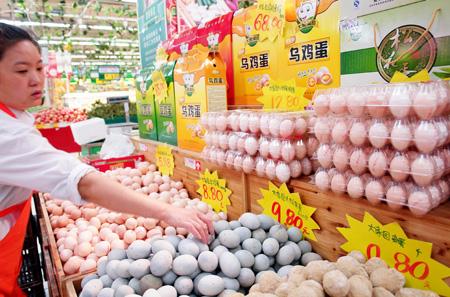
Data showed that the price of eggs increased by 3.2 percent last month, keeping food prices the main cause of inflation. [Photo / China Daily]
Price of pork increases for 10 consecutive weeks, driving up inflation
BEIJING - China's inflation is expected to reach a three-year high in June - possibly exceeding 6 percent for the first time since August, 2008 - driven by soaring food prices and living expenses, analysts said.
The country's consumer price index (CPI), a main gauge of inflation, is predicted to rise as high as 6.2 percent in June, 0.7 percentage points higher than the figure in May, a China International Capital Corp Ltd (CICC) report said.
Other predictions from investment-bank economists are all above 6 percent. The National Bureau of Statistics (NBS) plans to release the June figures on July 15.
Inflation remains high although the economy continues to grow at a stable and relatively rapid pace, the People's Bank of China (PBOC), the country's central bank, said in its online statement on Monday.
The PBOC reiterated that it will continue to maintain a "prudent" monetary stance and will use multiple tools to effectively manage liquidity and tame inflation.
"Economic and financial development still face complicated challenges," it said, adding that there are still many risks ahead as the global economy recovers.
Food prices, which account for about 30 percent of the CPI basket, have been driven up mainly by the pork price, which rose 11.7 percent in May and 11.5 percent in April, contributing 63.6 percent to the CPI, according to the NBS.
Data from the Ministry of Commerce showed that the price of pork had increased for 10 consecutive weeks by the end of June. The wholesale price of pork rose by 13.3 percent in June, from 22.17 yuan ($3.43) to 24.68 yuan a kilogram.
The ministry's data also showed that seafood prices climbed 4.3 percent month-on-month in June, and eggs by 3.2 percent, keeping food prices the main cause of the nation's inflation.
The rapid increases in the cost of rent and industrial electricity are likely to further drive up living expenses, so non-food prices may rise higher, said Pan Xiangdong, chief economist at China Galaxy Securities Co Ltd.
Living expenses increased by 6.1 percent in May from a year earlier, the second-fastest increase, after that of food prices, according to the NBS. Non-food prices rose 2.9 percent year-on-year in May, 0.2 percentage points higher than April.
Wang Jinbin, assistant to the dean at the School of Economics in Renmin University of China, said that the full-year CPI is likely to be 4.7 percent in 2011 and GDP growth to slow to 9.6 percent.
China is likely to keep a high inflation rate, between 4 percent and 5 percent annually, in the long term, said Pu Yonghao, head of Wealth Management Research Asia-Pacific and chief investment strategist at UBS Wealth Management and Business Banking.
"The average CPI in the past 10 years has been 2.2 percent, and the figure may be 4.4 percent in the next 10 years," said Yu.
The fast growth in raw material prices, especially for oil, as well as increasing labor costs will remain a major cause of stubborn inflation, according to Yu.
"However, it is unlikely that inflation will get out of control," Yu said. "The government's measures, including tightening monetary policies, have taken effect."
However, the central bank's tight policies - raising commercial banks' reserve requirement ratio (RRR) six times since the beginning of this year - have pushed some small and medium-sized enterprises to turn to illegal lenders.
The PBOC might not raise the RRR in July because monetary policies that are too tight can hurt the financial market and overcool the economy, said Li Xunlei, chief economist at Shanghai-based Guotai Junan Securities.





